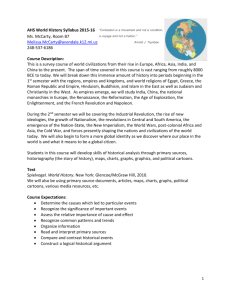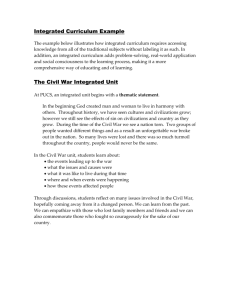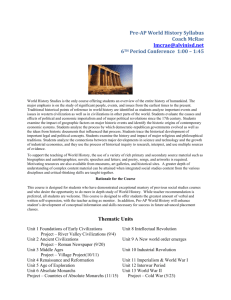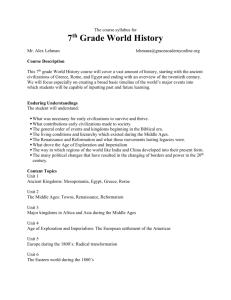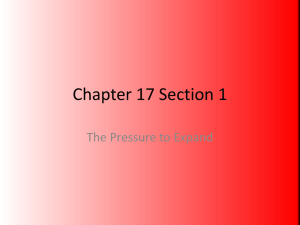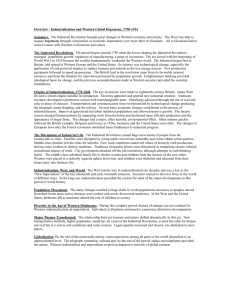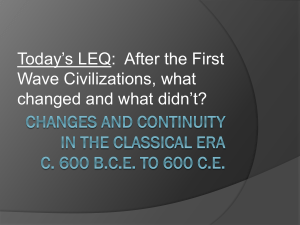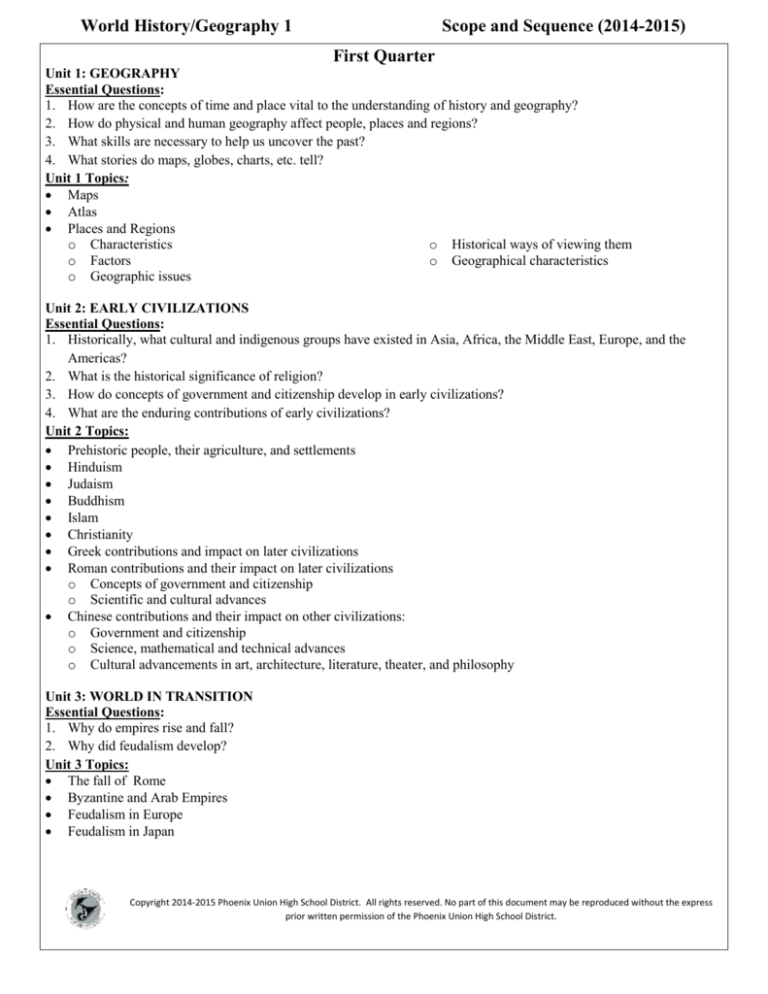
World History/Geography 1
Scope and Sequence (2014-2015)
First Quarter
Unit 1: GEOGRAPHY
Essential Questions:
1. How are the concepts of time and place vital to the understanding of history and geography?
2. How do physical and human geography affect people, places and regions?
3. What skills are necessary to help us uncover the past?
4. What stories do maps, globes, charts, etc. tell?
Unit 1 Topics:
Maps
Atlas
Places and Regions
o Characteristics
o Historical ways of viewing them
o Factors
o Geographical characteristics
o Geographic issues
Unit 2: EARLY CIVILIZATIONS
Essential Questions:
1. Historically, what cultural and indigenous groups have existed in Asia, Africa, the Middle East, Europe, and the
Americas?
2. What is the historical significance of religion?
3. How do concepts of government and citizenship develop in early civilizations?
4. What are the enduring contributions of early civilizations?
Unit 2 Topics:
Prehistoric people, their agriculture, and settlements
Hinduism
Judaism
Buddhism
Islam
Christianity
Greek contributions and impact on later civilizations
Roman contributions and their impact on later civilizations
o Concepts of government and citizenship
o Scientific and cultural advances
Chinese contributions and their impact on other civilizations:
o Government and citizenship
o Science, mathematical and technical advances
o Cultural advancements in art, architecture, literature, theater, and philosophy
Unit 3: WORLD IN TRANSITION
Essential Questions:
1. Why do empires rise and fall?
2. Why did feudalism develop?
Unit 3 Topics:
The fall of Rome
Byzantine and Arab Empires
Feudalism in Europe
Feudalism in Japan
Copyright 2014-2015 Phoenix Union High School District. All rights reserved. No part of this document may be reproduced without the express
prior written permission of the Phoenix Union High School District.
Second Quarter
Unit 3: WORLD IN TRANSITION (continued)
Essential Questions:
1. What was the impact of the interaction between Europe and Asia?
Unit 3 Topics:
Development of empires
European and Asian civilizations from the 12th to 16th Centuries:
o Crusades
o Silk Roads
o Culture
o Plague
Unit 4: Renaissance and Reformation
Essential Questions:
1. How did the Renaissance change people’s view of their world?
2. How do the arts, literature and science of a society reflect their values?
3. How did the ideas of the Reformation affect individuals and society?
4. When can we justify challenging authority?
Unit 4 Topics:
Renaissance thoughts and theories:
o Rediscovery of Greek and Roman ideas
o Humanism
o Scientific approach to the natural world
o Middle Eastern contributions
o Innovations in art and sciences
Protestant Reformation
Catholic Reformation
Unit 5: Encounters and Exchange
Essential Questions:
1. What are the motivations and effects of exploration?
2. Was the Age of Exploration motivated more by idealism or self-interest?
3. Should the explorers during the Age of Exploration be considered heroes?
4. What are lasting impacts from the European Age of Exploration on the world?
Unit 5 Topics:
Interactions among civilizations focusing on:
o reasons for European exploration
o impact of expansion and colonization on Europe
o impact of expansion and colonization on Africa, Asia, and the Americas
o Role of disease in conquest
o Role of Trade
o Navigational technology
o Impact and ramifications of slavery and international slave trade
o Contrasting motives and methods for colonization
Copyright 2014-2015 Phoenix Union High School District. All rights reserved. No part of this document may be reproduced without the express
prior written permission of the Phoenix Union High School District.
World History/Geography 2
Scope and Sequence (2014-2015)
Third Quarter
Unit 6: AGE OF REVOLUTIONS
Essential Questions:
1. Can absolute rule ever be justified?
2. How did the Scientific Revolution change the way people understood the world?
3. How did the Enlightenment change peoples’ views of government?
4. What causes people to revolt?
Unit 6 Topics:
Representative, limited government in England
o The Magna Carta
o Parliamentary Government
o The English Bill of Rights
o The ideas of John Locke
Absolute monarchies in other European nations
Heliocentrism
Newton’s Laws
Scientific method
Enlightenment ideas:
o Deism
o Political thought
o Role of women
o Social change
French Revolution and the role of Napoleon
o Reign of Terror
o Defeat of Napoleon
o Rise of Napoleon
o Congress of Vienna
o Spread of nationalism in Europe
Revolutionary and independence movements in Latin America
Unit 7: INDUSTRIAL REVOLUTION/AGE OF IMPERIALISM
Essential Questions:
1. What were the impacts and long-term effects of the Industrial Revolution on political and economy theories, society, and the
environment?
2. What were the impacts and long-term effects of Imperialism on society and the environment?
3. To what extent should European nations be ashamed or proud of their imperialist past?
Unit 7 Topics:
Industrial Revolution
Political and Economic Theories
o Nationalism
o Socialism
o Anarchism
o Communism
o Capitalism
Causes and effects of European Imperialism
o Berlin Conference
o Boer War
o African Imperialism
o Division of the world into empires
o Resistance movements
Responses to imperialism
Japanese response to European/American imperialism: Closed door policy
Unit 8: WORLD WAR ONE
Essential Questions:
1. What were the causes of WWI?
2. What are the effects of total war on the government, economy, society, and environment in a country?
Unit 8 Topics:
The causes of World War I:
o Rise of nationalism
o Rise of ethnic and ideological conflicts in the
o Unification of Germany
Balkans and Austria-Hungary
o Otto von Bismarck’s leadership
o The decline of the Ottoman Empire
The impact of the changing nature of warfare in World War I focusing on:
o Trench warfare
o Mechanization of war: Machine gun, Gasoline,
o American Involvement
Submarine, Tanks, Chemicals
Copyright 2014-2015 Phoenix Union High School District. All rights reserved. No part of this document may be reproduced without the express
prior written permission of the Phoenix Union High School District.
Fourth Quarter
Unit 8: WORLD WAR ONE (continued)
Essential Questions:
1. Was Russia ripe for revolution in 1917?
2. How was the Treaty of Versailles flawed?
Unit 8 Topics:
The end of World War I and its aftermath focusing on:
o Russian Revolution
o Treaty of Versailles
o End of empires
o Continuation of colonial systems
Unit 9: WORLD WAR TWO/COLD WAR
Essential Questions:
1. Do hard times create totalitarian governments?
2. Is appeasement an effective foreign policy?
3. Has global society today learned the lessons of the Holocaust?
4. Did the Cold War rivalry between the two superpowers help or hurt the world community?
Unit 9 Topics:
The period between World War I and World War II focusing on:
o Rise of fascism and dictatorships
o Growth of the Japanese empire
o Postwar economic problems
o Challenges to the world order
o New alliances
World War II focusing on:
o Political ideologies
o Treatment of civilian populations
o Military strategies
o holocaust
Genocide as a manifestation of extreme nationalism in the 20th century
The Cold War focusing on:
o The superpowers of The United States, The
o Developing world
Soviet Union and China
o Korea War
o Division of Europe
o Vietnam War
The fall of the Soviet Union
Unit 10: CONTEMPORARY WORLD
Essential Questions:
1. What were the driving forces and consequences of nations gaining their independence after WWII?
2. What are the immediate and long-term consequences of population growth on society and environment?
3. What are the costs and benefits of global war, ethnic conflicts, terrorism, genocide, and diplomatic exchanges?
Unit 10 Topics:
Independence movements of emerging nations
The roots of terrorism focusing on their:
o Background and motives
o Religious conflict
o Background on modern Middle East conflicts
o Economic and political inequalities and cultural insensitivities
Political and economic interdependence during the second half of the 20th century focusing on:
o Economics, global wage inequalities
o Technology
o Multinational corporations
o Growth of international government organizations
Environmental issues from a global perspective
Connect current events with historical events and issues using information from class discussions and various resources
Copyright 2014-2015 Phoenix Union High School District. All rights reserved. No part of this document may be reproduced without the express
prior written permission of the Phoenix Union High School District.

